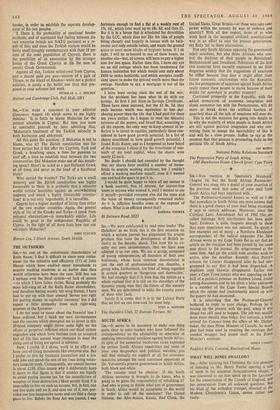SOUTH AFRICA seems to be necessary to make one thing
quite clear to your readers who have followed the correspondence on the advisability or otherwise of applying international sanctions against South Africa. In spite of the somewhat vociferous views expressed by certain South African expatriates and some of your own do-gooders and political weirdies, you will find virtually no support at all for economic sanctions amongst the most convinced opponents of Dr. Verwoerd's present government in South Africa, both black and white.
The reasons must be obvious: if the South African economy is brought to its knees, who is going to be given the responsibility of rebuilding it? And who is going to decide what sort of government in South Africa would be acceptable to the world in order to call off the sanctions? The United Nations, the Afro-Asians, Russia, Red China, the
United States, Great Britain—or those who take over power within the country by way of violence and anarchy? With all due respect, those of us who work hard in the accepted civilised, constitutional way in an effort to oust the present government, say flatly 'no' to those alternatives.
Not only South Africans opposing the government reject sanctions, but also those Africans who con- trol the destinies of their people in Basutoland, Bechuanaland and Swaziland. Politicians of the first two countries have recently expressed to me their desperate anxiety that the suggestions of sanctions be stifled because they fear it might affect their future economic relationships with the Republic. Do the protagonists of sanctions against South Africa really expect these people to starve because of their dislike for apartheid in another country?
Continued prosperity in the Republic, with the added momentum of economic integration and closer economic ties with the Protectorates, will do more to break down the artificial barriers of apartheid than all the talk of sanctions will ever do.
This is not the occasion for going into details as to why the majority of white people in South Africa are still against political integration and why con- verting them to accept the inevitability of this is and will be a slow process. Suffice to say at the moment that that process is proceeding daily in the political life of South Africa.
JAN BOTHA National Public Relations Secretary The Progressive Party of South Africa.
1107 Dumbarton House, Church Street, Cape TolVn


































 Previous page
Previous page